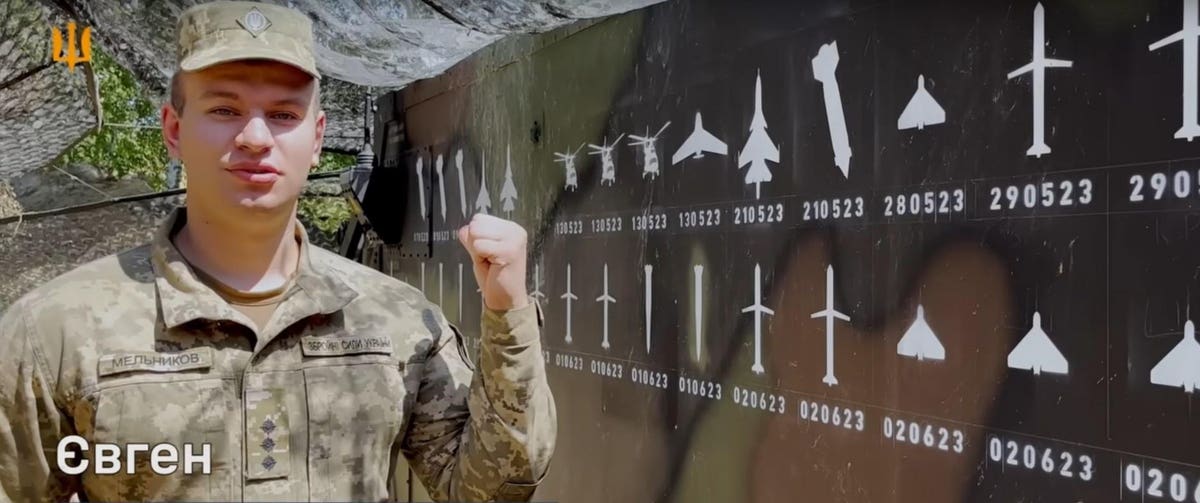On May 13, a Russian air force strike package took off at bases in western Russia and flew toward the border with Ukraine.
Minutes later, a single Ukrainian air force Patriot surface-to-air missile battery shot down at least four, and possibly five, of the fighters and helicopters in the package.
Eleven aviators died over Bryansk Oblast in what was one of the worst single-day losses for the Russian air force in the nearly 17 months of its wider war on Ukraine.
A video that the Ukrainian air force published on July 3 hints at some of the details of the missile ambush. For starters, the Patriot crew believes it shot down five Russian aircraft that day, not the four that Russian media have confirmed.
The strike package included, at a minimum, a Sukhoi Su-34 fighter-bomber, a Sukhoi Su-35 fighter and two Mil Mi-8 helicopters, at least one of which reportedly was an Mi-8MTPR-1 model carrying Rychag-AV radar-jamming equipment. It’s possible the other Mi-8 was a dedicated search-and-rescue helicopter.
It seems the two crew aboard the Su-34 were flying at high altitude toward the Ukrainian border, aiming to lob at least one UPAB-1500V glide bomb at the city of Chernihiv in northern Ukraine. The single pilot aboard the Su-35 was protecting the Su-34 crew from Ukrainian interceptors.
The Russians just a few weeks earlier had begun using the 3,300-pound glide bomb—a crude analogue of the winged Joint Direct Attack Munition glide bomb that the United States has supplied to Ukraine—to target Ukrainian cities and military forces.
Launched from 40,000 feet, the glide bomb can travel around 25 miles—which, at it happens, is the distance from the Russia-Ukraine border to Chernihiv. Steady supplies of Western-made air-defense systems—Patriots, Iris-Ts and NASAMS, among others—had made it extremely dangerous for Russian warplanes to cross the border.
The UPAB-1500V helped to solve that problem by giving Russian fighter crews the striking range to conduct their attacks without crossing into Ukraine. Prior to this spring, just one Ukrainian SAM system, the S-300, had the range to threaten Russian planes flying on the Russian side of the border. And the Ukrainians were known to be running out of missiles for the Soviet-vintage S-300 batteries.
The arrival of Patriot batteries—from the United States, Germany and The Netherlands—changed all that. The PAC-2 variant of the Patriot that Ukraine operates can hit aircraft and missiles as far as a hundred miles away. A Patriot battery can remain safely on the Ukrainian side of the border and still intercept Russian glide-bombers before they drop their bombs.
The Patriot battery that shot down those four or five Russian aircraft on May 13 had just joined the fight. Dated kill markings that are visible in the Ukrainian air force’s video indicate the battery had shot down just three targets prior to May 13: a trio of ballistic missiles on May 11 or 12.
Exactly how the ambush played out is unclear. It’s possible the Patriot shot down the two Sukhois then waited as the Mi-8s flew in to search for survivors. The Ukrainians then shot down two or three of the helicopters.
But it’s worth noting that Fighterbomber, a popular Russian aviation channel on Telegram, claimed the shoot-downs happened in the span of just two minutes.
If true, that means the Mi-8s already were flying nearby when the two Sukhois went down—unless, of course, the Ukrainians targeted the helicopters first. It’s possible the Mi-8MTPR-1 was trying, and apparently failing, to jam Ukrainian air-defenses.
In any event, the Russians lost a lot of aircraft and crews, fast. Writing off at least one Mi-8MTPR-1 was particularly painful. The air force had just 20 of the radar-jamming ‘copters. It lost at least one more of them during the abortive rebellion by The Wagner Group mercenaries on June 23 and 24.
Whether the ambush compelled the Russian air force to change its tactics is difficult to determine. There’s ample evidence of recent glide-bomb attacks along the front line in southern Ukraine. There’s less evidence the glide-bombers still are striking in the north, where many of Ukraine’s best air-defenses are concentrated.
Instead, Russian forces continue to strike at Kyiv, Chernihiv and other northern cities with explosives-laden drones as well as with cruise missiles fired by strategic bombers from launch points hundreds of miles from the border.
But the Patriots are shooting down many of those drones and missiles, too. Kill markings on the Patriot system that shot down those four or five Russian aircraft on May 13 indicate the same battery destroyed more than a dozen cruise missiles and drones, plus a few ballistic missiles, in June.
Read the full article here





